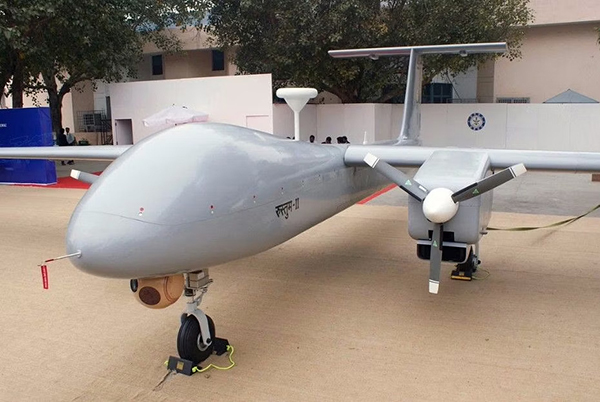Hindustan Aeronautics Limited (HAL) is slated to start the production of the first five Rustom-II TAPAS Drones. The flight control systems, avionics and data-linked systems for the first 5 Tapas drones are ready. Rustom-II medium-altitude long-endurance (MALE) unmanned aerial vehicle (UAV) can reach the required altitude of 28,000 ft.
In an official communication ADE also confirmed the TAPAS drones to be armed. Work on this is progressing fast.
Most of the components required for the production of the drone is expected to go to private defence agencies, HAL’s role would be that of a lead integrator. The avionics, electronics, sensors, and ground control systems is likely to be manufactured by the state-owned defence sector behemoth BEL. DRDO’s Defence Electronics Application Laboratory, Dehradun, is responsible for developing and integrating the data links for Rustom-II.
Unmanned, Rustom-II has an overall length of 9.5 m and a wingspan of 20.6 m. It is powered by two Saturn 36T turboprop engines, each rated at 74.57 kW (100 hp). Also known as TAPAS-BH-201 (Tactical Advanced Platform for Aerial Surveillance-Beyond Horizon-201), Rustom-II weighs 1,800 kg and has a cruising speed of 135 kt.
It is designed to carry payloads of up to 350 kg. The mission payloads are reportedly Israel-sourced and include electro-optic (EO) and infrared (IR) sensors, synthetic aperture radar (SAR) and maritime patrol radars, communications relay, and electronic intelligence (ELINT) and communications intelligence (COMINT) packages.
In November 2021 the DRDO demonstrated Rustom-II’s ability to take off and land autonomously as well as its ability to utilise India’s satellite-based navigation system – GPS-aided GEO augmented navigation (GAGAN) – that has been jointly built by the Indian Space Research Organisation (ISRO) and Airports Authority of India (AAI).


















